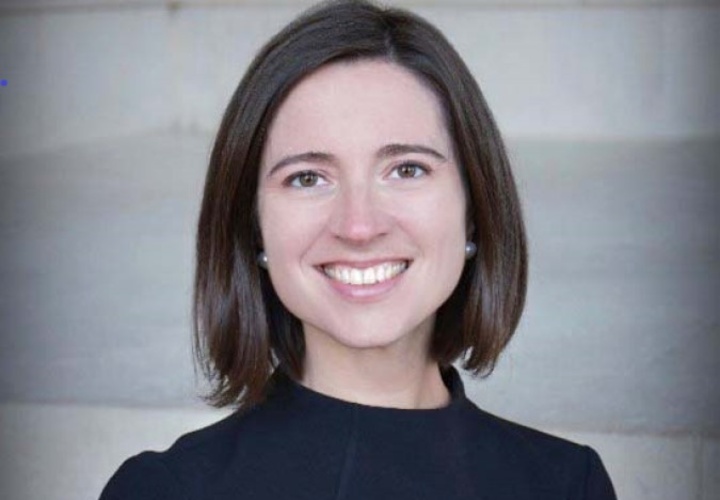Elizabeth Jurinka Joins Yale's Tobin Center for Economic Policy as Senior Policy Fellow

Elizabeth (Liz) Jurinka, a health policy expert and former special assistant to President Biden, has joined Yale University’s Tobin Center for Economic Policy (Tobin Center) as a Senior Policy Fellow. Jurinka has been on the frontlines of health policy for more than a decade and brings a wealth of insight and perspective on how data and rigorous analysis can be deployed to catalyze and shape public policy as demonstrated by her track record of legislative accomplishments.
During her time as a White House senate legislative affairs liaison, Jurinka was actively engaged in promoting, furthering, and passing the President’s agenda through Congress, including the American Rescue Plan (ARP), the Infrastructure Investment and Jobs Act (IIJA), and the Inflation Reduction Act (IRA). Prior to her time in the White House, she served as Chief Health Advisor to Chairman Ron Wyden (D-OR) and the Senate Finance Committee where she oversaw the development and execution of key health care priorities within the Committee’s extensive health care jurisdiction of Medicare, Medicaid, and key components of the Affordable Care Act.
In this role, Jurinka was instrumental in developing the arguments and strategy used to successfully prevent repeal of the Affordable Care Act, and she spearheaded negotiations with the Committee Republicans on prescription drug pricing reform that later became the basis for policies passed in the IRA. She also negotiated several other major health care bills during her tenure, among which were the repeal of the Sustainable Growth Rate, the longest CHIP extension since the program’s enactment, and chronic care reform.
“We’re delighted to have Liz join our growing team. She not only brings a wealth of experience but is uniquely qualified to help improve the way academics can engage with the policy community and use their research to improve lives,” said David Wilkinson, Executive Director of the Tobin Center.
“It’s an honor to join the team at the Tobin Center, to help facilitate and generate smart, sensible health care reform ideas that can make a difference for patients and taxpayers alike. I have seen firsthand what a difference data-driven, innovative, and thoughtful policy development can make to lawmakers, regulators, and the private sector. The Tobin Center is uniquely positioned to be a go-to for all three, and I couldn’t be more excited to get to work,” said Jurinka.
Jurinka will be an essential point of reference and a prominent voice for the Tobin Center on health care policy—one of the leading domestic policy issues of the day. In her new role, Jurinka will leverage her expertise and relationships to shape, elevate, and advance the Center’s state- and federal-focused health policy education agendas. This includes, but is not limited to, directly educating policy-makers on areas where she has unique expertise, helping scholars identify policy-relevant research topics, translating research for policy-makers and elected officials, and deepening the relationships between academics and the policy community.
“The work we do at Yale needs to improve the lives of those outside our walls. One of the best ways we can do that is by using our research to drive evidence-based policy. We’ve seen real success here with our past work helping catalyze legislation that protects the public from surprise medical bills. Liz is going to help us use our research more systematically to do good. With Liz’s help, we will continue to mobilize our research to solve big problems and ensure more Americans can live healthier, more fulfilling lives,” said Zack Cooper, an associate professor of health policy at the Yale School of Public Health and of economics in the Faculty of Arts and Sciences and associate faculty director of the Tobin Center.
A new enterprise at Yale, the Tobin Center aims to advance research and policy to strengthen families, communities, and the nation by prioritizing those critical national issues for which data-driven insights can have immediate impacts. Such issues include health care, climate, education and early childhood systems, mobility and opportunity, and digital markets.